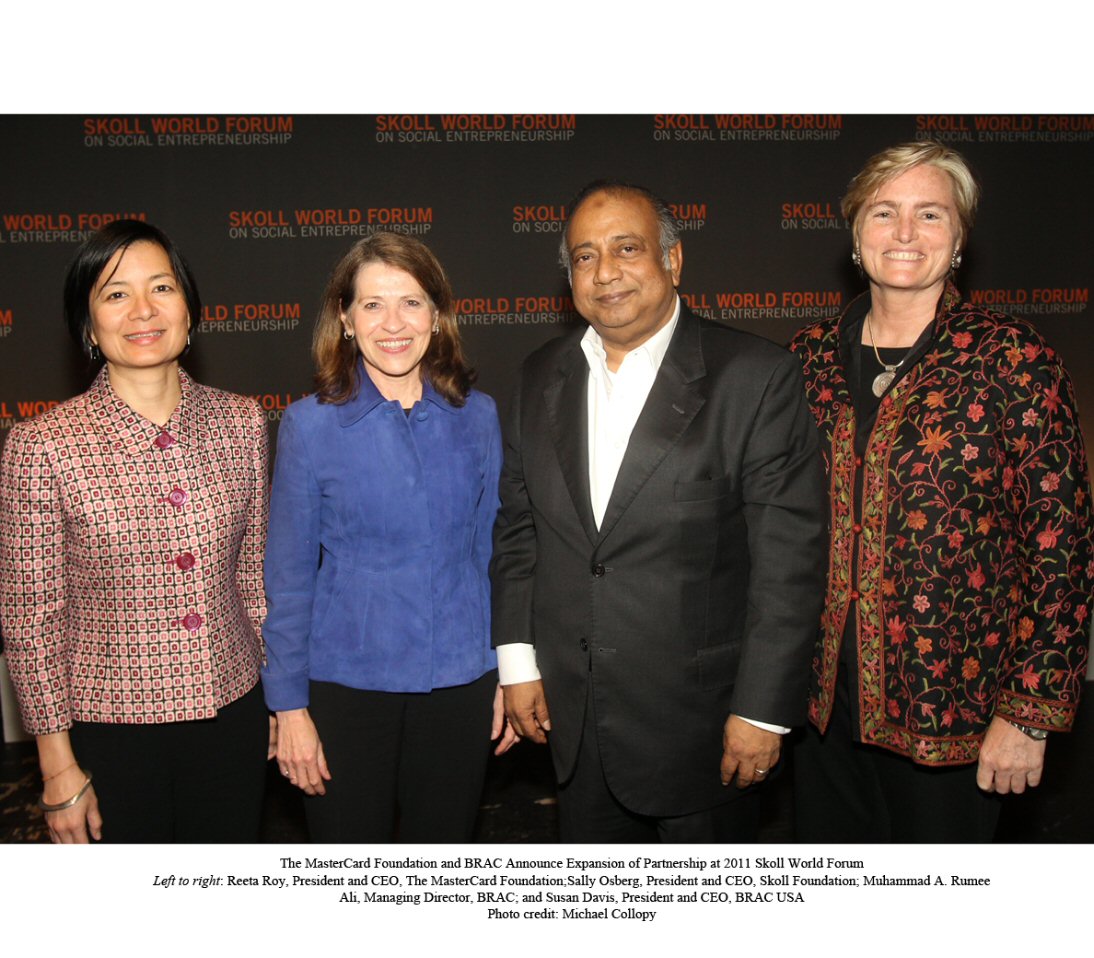OXFORD, UNITED KINGDOM--(Marketwire - March 30, 2011) -
BRAC and The MasterCard Foundation today announced the expansion of a $45 million partnership to scale BRAC's innovative microfinance multiplied model in Uganda. The announcement, which was made at the opening plenary of the 2011 Skoll World Forum on Social Entrepreneurship, will enable BRAC to expand its network to 129 branches, benefiting more than four million Ugandans.
"The MasterCard Foundation aims to scale innovative microfinance programs in Africa to improve the lives of people living in poverty," said Reeta Roy, President and CEO of The MasterCard Foundation. "BRAC's holistic approach integrates microfinance and livelihood services to help women to become productive economically and build assets to benefit their families."
Today's announcement builds on an existing partnership with The MasterCard Foundation in Uganda, where BRAC's approach, which it calls "microfinance multiplied," increases the ability of poor clients to productively use microloans to augment their incomes and build their assets, as well as stimulate economic and social development within their communities.
"Through this expanded partnership with The MasterCard Foundation, BRAC will be able to deepen the outreach of our current microfinance and livelihoods program in Uganda and expand our network to 129 branches," said Fazle Hasan Abed, BRAC's Founder & Chairperson. "We will also be undertaking a series of long-term studies to assess impact of integrated approach to services on lives of clients, their families and their communities."
Uganda is a country of 30 million people. More than 60 percent of the population does not have access to financial services. The BRAC program will provide economically active women with loans, training and technical support to enable them to improve their livelihoods, particularly those in the agricultural poultry and livestock sectors. Additionally, the program will expand vocational and life-skills education for adolescent girls.
"The theme of the 2011 Skoll World Forum is Large Scale Change—ecosystems, networks and collaborative action," said Sally Osberg, President and CEO, Skoll Foundation. "This announcement by BRAC and The MasterCard Foundation is a great example of collaborative action, innovation, and entrepreneurship helping solve the world's most pressing problems."
About the Partnership
In October 2008, The MasterCard Foundation committed $19.6 million to enable BRAC to expand its microfinance multiplied program in Uganda, to open 51 branches and serve two million people. Among the objectives, was a strategic focus to help BRAC document the long-term impact of this multiplier approach in Africa.
Building on a shared commitment to learning and strengthening the field of microfinance, the partnership is also enabling BRAC to expand the capacity of its Uganda research and evaluation unit to undertake longitudinal studies investigating the effectiveness of BRAC's integrated microfinance and livelihoods model. This data set will allow BRAC to conduct sub-sector analyses on various aspects of its program. BRAC is also piloting a Poverty Score-card which tracks ten key poverty-related indicators among its clients and uses the cumulative scores to track long-term progress. The scorecard is embedded within the Management Information System and will capture data each time a member takes a loan over the next few years.
BRAC chose Uganda because of the opportunity to make an impact in a post-conflict country with high poverty rates and where 72 percent of the population has no access to formal financial services. Although Uganda has a competitive microfinance market, most microfinance providers are concentrated in urban areas. Seventy percent of employment in Uganda is based on agriculture. Most of the rural poor are small scale farmers and lack access to finance, agricultural inputs and markets. Uganda is also a young country where 78 percent of the population is under the age of 30. As such, there is an urgency to equip young people with skills to enter the workforce.
To date the program has demonstrated outstanding success, providing microfinance loans to approximately 110,000 borrowers, training and access to high quality agricultural inputs to 50,000 farmers, productivity enhancing services to 124,000 poultry & livestock rearers, and access to basic health services to more than 1.5 million people. BRAC is also empowering 32,000 adolescent girls and young people from poor and marginal households, providing them education, training and access to financial services.
Today's announcement of an additional $25 million will enable BRAC to build on this success by deepening the outreach of the current microfinance and livelihoods program and expand it by opening 40 new branches; improving skills and livelihoods options of young people across all program areas, including the expansion of the adolescent girls program; continuing to document and disseminate results on long-term program impact and implementing a sustainability plan that phases out Foundation funding in five years.









